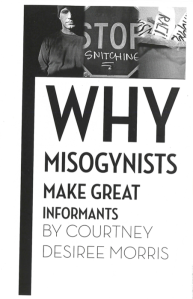 As illuminated in the essay, Why Misogynists Make Great Informants by Courtney Desiree Morris, safer spaces are critical to security culture:
As illuminated in the essay, Why Misogynists Make Great Informants by Courtney Desiree Morris, safer spaces are critical to security culture:
“To save our movements, we need to come to terms with the connections between gender violence, male privilege, and the strategies that informants (and people who just act like them) use to destabilize radical movements. Time and again heterosexual men in radical movements have been allowed to assert their privilege and subordinate others. Despite all that we say to the contrary, the fact is that radical social movements and organizations in the United States have refused to seriously address gender violence as a threat to the survival of our struggles…
Maybe if organizers made collective accountability around gender violence a central part of our practices we could neutralize people who are working on behalf of the state to undermine our struggles. I’m not talking about witch hunts; I’m talking about organizing in such a way that we nip a potential Brandon Darby in the bud before he can hurt more people.”
——————————————————————————————————————————————————
 An article published years later in 2013, Fundamental Requirement for Organised Safer Space, echoes this conceptualization of why safer spaces are important.
An article published years later in 2013, Fundamental Requirement for Organised Safer Space, echoes this conceptualization of why safer spaces are important.
“Safer spaces thinking has come about through survivors of abuse determining the form that their struggle must take and the ways in which they wish to receive support. For every person who has been able to speak out there are hundreds of thousands that could not. We should remember that while the voices we hear may seem few, they carry with them a truth that, if ignored, will render any attempts towards social revolution a futile gesture.”
—————————————————————————————————————————————————
 In October of 2013, The Silent Barn, an art space in Bushwick hosted a panel discussion on safer spaces. Nina Mashurova later published an article summarizing the event.
In October of 2013, The Silent Barn, an art space in Bushwick hosted a panel discussion on safer spaces. Nina Mashurova later published an article summarizing the event.
“For a space to be truly challenging, it should take steps to challenge not just hegemonic paradigms of art but also hegemonic paradigms of how we relate to each other, how we negotiate power, whose voices we amplify, and whose safety we hope to protect.”
—————————————————————————————————————————————————
Links to various safer space policies can be found on these pages: Convergence, House, Organization, Social Center & Special Event. Please contact us if you can suggest a link for us to add or if you know of a policy that is not available online so that we can figure out a way to get it on our site.
